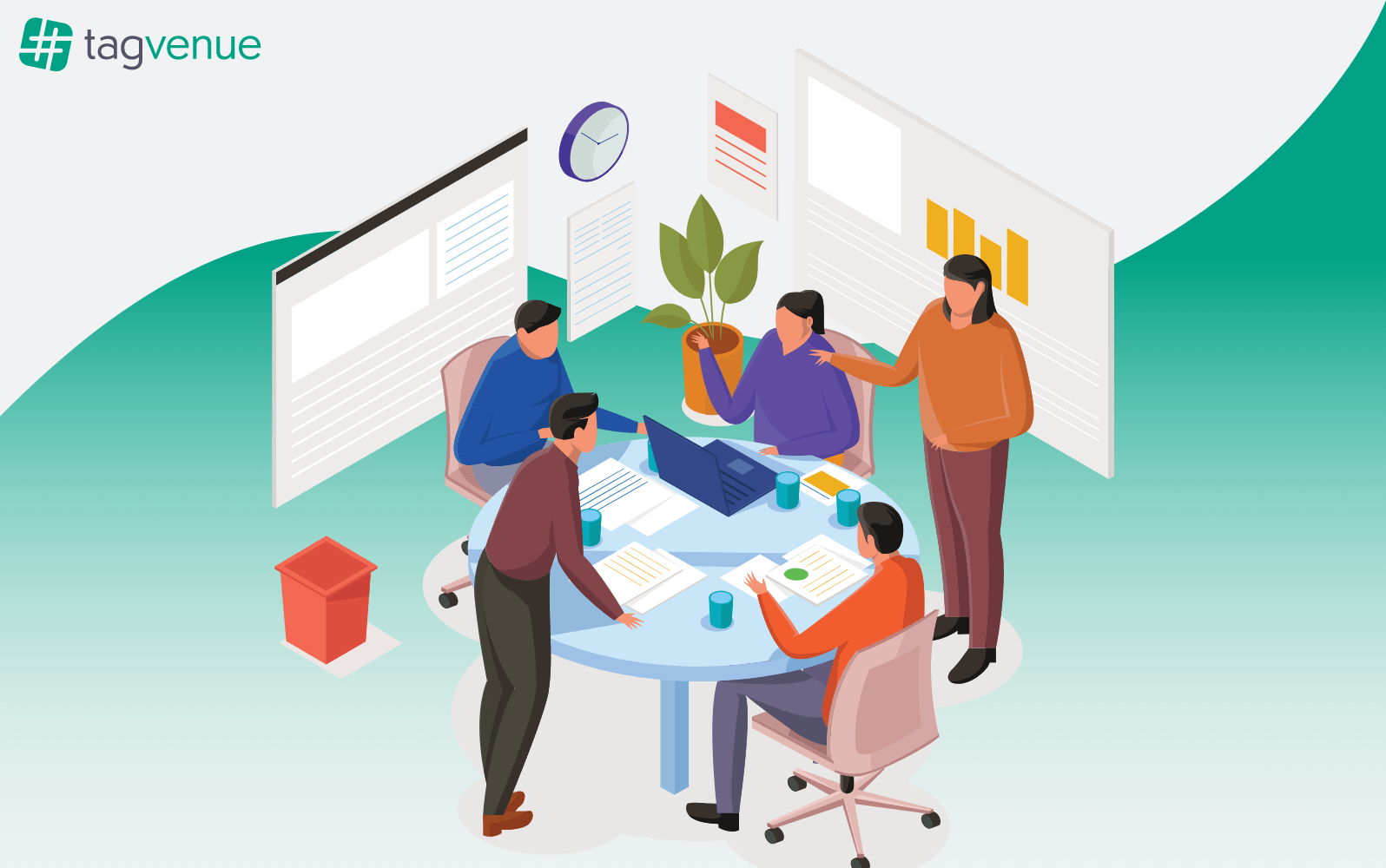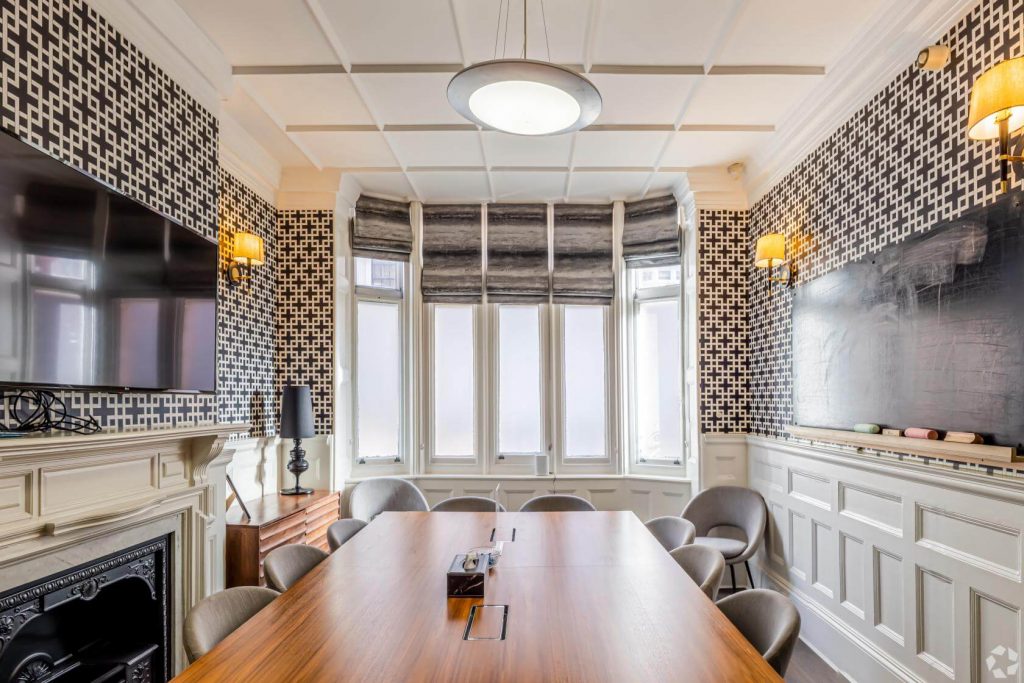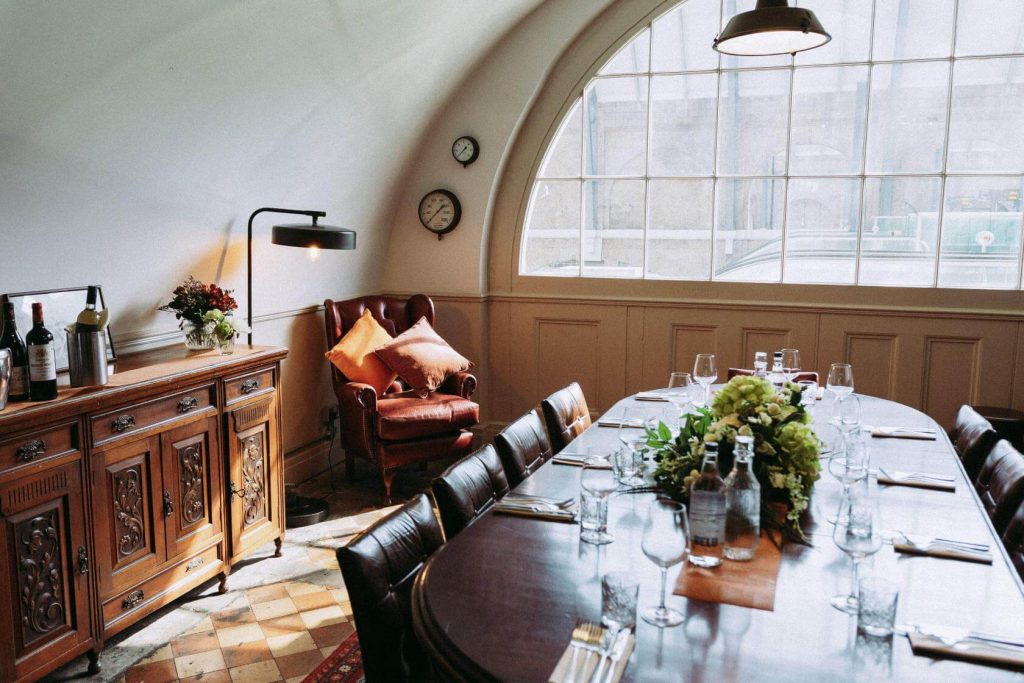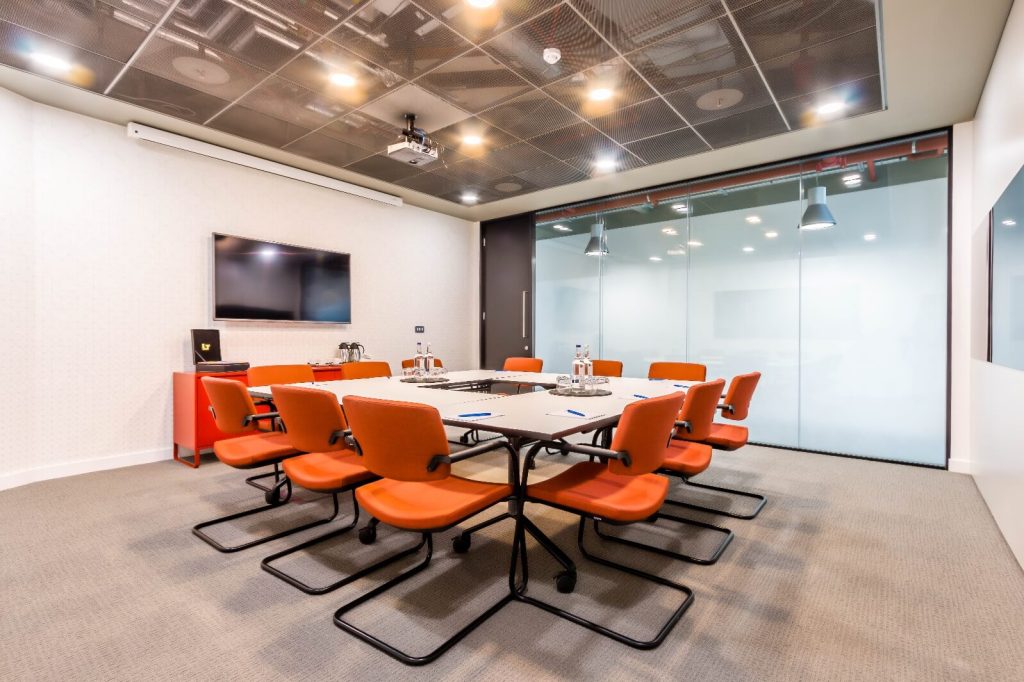How Much Does it Cost to Hire a Meeting Room in 2024?

Picking the right room is a crucial first step when organising a professional meeting. Let’s take a look at some of the particulars involved in this process – starting with the first question you are likely to ask: ‘How much does it cost to rent a meeting room?’
- What is the average cost of hiring a meeting room in the UK?
- Why should you rent a meeting room?
- How are meeting rooms priced?
- What factors impact a meeting room price?
- What kind of venues offer meeting rooms for hire?
- What should a modern meeting room have?
- How far ahead of the event do I need to book a meeting room?
- How can I rent a meeting room?
- To Wrap Things Up
- FAQ
What is the average cost of hiring a meeting room in the UK?

According to Tagvenue platform data, the average cost of renting a meeting room in the UK is a £65 hire fee per hour. That being said, our customers spend, on average, £250 per meeting (for a 4-hour meeting in a room suitable for 10 delegates).
Of course, prices will fluctuate significantly around this figure. These costs will fluctuate depending on the location, the type of venue you are hiring, the duration, and how many attendees you are expecting.
Why should you rent a meeting room?
An offsite meeting room is a common choice for business meetings that cannot be held in a company office. The could be several reasons to hold a meeting offsite:
- The main office may not have a room of sufficient size.
- The meeting may take place in a location where a company may not have a local office.
- Confidentiality issues or regulations may specify the need for a certain type of boardroom.
- Technological needs for training or remote meetings may pose issues that can only be solved by using a third-party meeting space.
Whatever the reason, meeting rooms are a great choice as they offer a highly professional atmosphere and significant ease of use.
How are meeting rooms priced?
Hire Fee (per day, per session or per hour)
Hire fee is a fixed price paid by the day, the hour or the session. This fee type usually covers the use of the space and some basic equipment such as furniture, screens and wi-fi. The offer may also include basic refreshments, but verify this with the venue manager.
70% of meetings booked through Tagvenue charge a hire fee (per day, per session or per hour). This is an easy and flexible option for all types of meetings. For a meeting that will last less than a full work day, or for a meeting with a small guest list, this is a great choice.
Delegate Day Rate (DDR)
A per person package is another payment option for venue hire and is common for corporate events. A per person package entails paying an agreed-upon rate per attending guest and includes the use of the space, food, drinks and sometimes even entertainment.
A DDR is a charge that is levied per attendee for the period of a half or the whole day. This charge generally covers the rent of the room, as well as catering options and a general AV package.
This option is a particularly good fit for conferences or other longer meetings as it also often includes dinner. It is also a rather common option, as 34% of all the meeting rooms on the Tagvenue platform charge according to this pricing model. As an addendum to this hire fee, hotels offer the option of a 24-hour rate (an extra rate that can be charged if the meeting goes late and attendees need to stay over).
Minimum Spend
Minimum spend means that the use of the private meeting space is free if you spend an agreed-upon amount on food and drinks. Venues charging a minimum spend tend to be restaurants and bars, and as such are not necessarily equipped with all the things needed for a formal meeting. Venues with a minimum spend option are great for business lunch events.
What factors impact a meeting room price?
Prices for meeting rooms will fluctuate due to a range of factors: city, district, meeting room size, onsite technology equipment and catering options. If you are hunting for a meeting room and you are on a budget, consider these factors seriously:
- City – A meeting room in London will definitely cost more than the same-sized space in any other city in the UK. So when planning your event, consider the importance of your locale. If you are simply looking for a transportation hub, you may have some room to be creative in your choice.
- District – Does your meeting need to take place near your office? Your district of choice can also affect the price, so if you find that one location doesn’t suit, search elsewhere.
- Size – Meeting room size will obviously affect the cost. However, depending on the venue this may not be as great an expense as you think. Just be sure that the room will be comfortable and not too crowded for the numbers you expect.
- Day of the week – According to Tagvenue data, 68% of all meetings occur on Thursdays, Wednesdays and Tuesdays, while 23% of meetings happen on Mondays and Fridays. The price for these rooms can change even on low-demand days, so if you are looking to lower costs, take this into consideration.
- Technology – Your tech needs are likely to go way beyond just WiFi. Screens, whiteboards or other types of modern collaboration technology can be essential for a successful meeting and a professional meeting space should provide them. And don’t forget to ensure enough power points for everyone to charge their phones or laptops. Tech room features are sometimes included in the price of the room and sometimes only available for an additional fee.
- Catering – Some meetings require more than a simple coffee, tea or biscuit approach. You might need to negotiate for any other refreshments (and refills) or you could be asked to offer lunch. These questions can affect the cost of the room hire, as well as determine the type of venue you choose.
- Luxury – This, of course, depends on your budget, but it is worthwhile to consider the purpose of the meeting and the impression you need to make. For some corporate get-togethers, an impressive venue is a must – especially for the C Suite level – just expect to pay for the privilege.
What kind of venues offer meeting rooms for hire?

There are several types of venues that offer rooms appropriate for meetings, whether they are corporate training, department meetings, or even board meetings, so be sure that you understand all of your options. When planning your meeting, consider the following types of venues:
Conference Centres
Conference centres are generally either venues that specialise in hiring only various-sized meeting spaces, or they are conference rooms and board rooms that are available for hire in larger office buildings. These centres are quite a popular choice and on Tagvenue’s platform, 48% of all meeting room bookings are in these types of venues.
Conference centres generally come with staff able to help you sort out all of your needs as well as a variety of spaces – meeting rooms, training rooms and board rooms – that are specifically designed for these events. Many of these centres will also offer basic amenities with the rooms, such as coffee and tea, as well as certain types of meeting accessories (whiteboards or flip charts, etc). They should also be able to help you hire any extras that you might need, i.e. multimedia tech or meals. These are a great choice for a neutral and highly professional space that offers clients quick set-up and efficient service.
Hotels
A hotel offers meeting organisers the chance to secure a highly professional space that is adaptable for a variety of meeting types. They come with the added inducements of professional and trained staff, as well as on-site dining and catering options, not to mention the possibility of accommodations, e.g. a hotel can be a great choice for delegates arriving from abroad. Many hotels are also conveniently located near airports. Be sure to check with the event manager, however, if you will need specialised meeting tech. Hotels make up approximately 10% of all meeting bookings on Tagvenue.
Restaurants and Pubs
A restaurant or pub is an option for more informal meetings and is the location for 10% of the meeting venues booked through Tagvenue. Depending on the chosen restaurant, you will not have to be relegated to the common dining room. Many venues offer private dining spaces, and some even offer meeting rooms, as well. While these are sure to be great for catering and are perfect for some types of meetings, in the case of any tech needs, you should investigate their offer thoroughly, and consult with outside vendors if this is your final choice.
What should a modern meeting room have?
When looking for the latest in modern meeting room tech, you need to look beyond the usual standbys of flipcharts and analogue whiteboards. Modern meetings need remote collaborative options, as well as great internet connections and a variety of other bells and whistles. Here are a few things to consider when planning for a modern meeting:
- Full wireless capability – check and see if your meeting room enables full wireless functionality. Whether it’s for simple browsing or an important presentation – speed and reliability are crucial. Also, the fewer accessories you need, the less problematic your start will be as you won’t have to hunt for a dongle or other attachments.
- Interactive whiteboards – any sort of interactive and collaborative tech will simplify your meeting and allow you to collaborate on your results. Also, all of your notes and thoughts can be saved and shared. Make sure you understand ahead of time if you will need any specialised platform or other interfaces.
- Video Conferencing – Whether it’s a large screen or monitor if you need to involve any long-distance team members, be ready to make them feel part of the action. Make sure that the bandwidth will support your meeting as precious time can be lost as everyone waits for people to turn their cameras on or off.
- Mobile Seating – Another consideration for your meeting is the arrangement of the room. Many meeting spaces offer a variety of seating and table arrangements. Modern meeting dynamics are essential to take into account when choosing your room’s arrangement.
How far ahead of the event do I need to book a meeting room?

According to Tagvenue’s data, most people start searching and contacting venues approximately 15 days before the meeting date. This will give you enough time to check out the wide range of available venues, contact the selected ones, and choose the best price and offer for your needs.
How can I rent a meeting room?
When starting the process of hiring a meeting room, you should first sit down and set out all of the relevant details for your event:
- How many attendees do you anticipate?
- What day of the week will you be likely to hold the meeting?
- Is there a particular location that would make the meeting go more smoothly?
- How long should the meeting take?
- And most important for some 🙂, will there be snacks?
Once you have made these early decisions, use a venue booking platform such as Tagvenue to speed up the search and booking process. With the help of smart filters, you can narrow down the search results and create a shortlist of venues. Contact the venues you are interested in and speak with the venue manager about your ideas. Best of all, you should ask for anything that you discuss to be set out in writing. Negotiate when needed, and don’t be afraid to say no if something doesn’t suit. The best kind of meeting is the one without too many snags, and early preparation will help prevent anything from slowing your event down.
All data cited in this report is based on statistical data from the Tagvenue.com platform.
To Wrap Things Up
As you can see, the cost of hiring a meeting room can vary due to numerous influences such as location, size, amenities, and the duration of the hire. However, understanding these factors is essential to effective budgeting and securing a meeting room that’s tailor-made for your needs. Let’s remember that the right meeting room can facilitate productive conversations, foster collaboration, and, indeed, make a positive impact on your business’s bottom line.
Keen to master the art of meeting planning? Dive into our ultimate meeting planning checklist! And for a fresh take on the importance of in-person meetings today, why not check out some insightful tips on how to hold effective in-person meetings?
FAQ
How can I save money when hiring a meeting room?
Consider booking your meeting room in a less busy area, choosing only the amenities you need, and booking the room for only as long as you need it. You can also save money by booking the room for multiple days or even a whole week if you expect to have regular meetings.
Do all meeting rooms come with presentation equipment?
Not all meeting rooms include presentation equipment. Some might come fully equipped with projectors, screens, whiteboards, and conference phones, while others might charge extra for these services. That’s why we recommend asking the venue manager before signing the contract.
What factors determine the cost of hiring a meeting room?
Several factors come into play. These include the location of the facility, the size of the room, amenities provided, the duration of the meeting, and any additional services required, such as catering or tech support.


